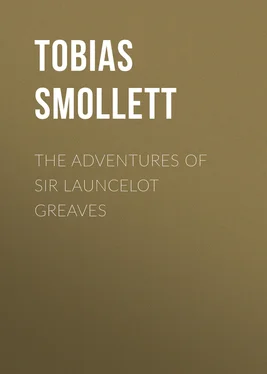Tobias Smollett - The Adventures of Sir Launcelot Greaves
Здесь есть возможность читать онлайн «Tobias Smollett - The Adventures of Sir Launcelot Greaves» — ознакомительный отрывок электронной книги совершенно бесплатно, а после прочтения отрывка купить полную версию. В некоторых случаях можно слушать аудио, скачать через торрент в формате fb2 и присутствует краткое содержание. Жанр: Прочие приключения, Прочие приключения, foreign_antique, foreign_prose, на английском языке. Описание произведения, (предисловие) а так же отзывы посетителей доступны на портале библиотеки ЛибКат.
- Название:The Adventures of Sir Launcelot Greaves
- Автор:
- Жанр:
- Год:неизвестен
- ISBN:нет данных
- Рейтинг книги:4 / 5. Голосов: 1
-
Избранное:Добавить в избранное
- Отзывы:
-
Ваша оценка:
- 80
- 1
- 2
- 3
- 4
- 5
The Adventures of Sir Launcelot Greaves: краткое содержание, описание и аннотация
Предлагаем к чтению аннотацию, описание, краткое содержание или предисловие (зависит от того, что написал сам автор книги «The Adventures of Sir Launcelot Greaves»). Если вы не нашли необходимую информацию о книге — напишите в комментариях, мы постараемся отыскать её.
The Adventures of Sir Launcelot Greaves — читать онлайн ознакомительный отрывок
Ниже представлен текст книги, разбитый по страницам. Система сохранения места последней прочитанной страницы, позволяет с удобством читать онлайн бесплатно книгу «The Adventures of Sir Launcelot Greaves», без необходимости каждый раз заново искать на чём Вы остановились. Поставьте закладку, и сможете в любой момент перейти на страницу, на которой закончили чтение.
Интервал:
Закладка:
“One instance of his generosity and justice deserves to be recorded in brass or marble. You must know, gemmen, the rector of the parish was lately dead, and Sir Everhard had promised the presentation to another clergyman. In the meantime, Sir Launcelot chancing one Sunday to ride through a lane, perceived a horse saddled and bridled, feeding on the side of a fence; and, casting his eyes around, beheld on the other side of the hedge an object lying extended on the ground, which he took to be the body of a murdered traveller. He forthwith alighted, and, leaping into the field, descried a man at full length, wrapped in a greatcoat and writhing in agony. Approaching nearer, he found it was a clergyman, in his gown and cassock. When he inquired into the case, and offered his assistance, the stranger rose up, thanked him for his courtesy, and declared that he was now very well. The knight who thought there was something mysterious in this incident, expressed a desire to know the cause of his rolling in the grass in that manner, and the clergyman, who knew his person, made no scruple in gratifying his curiosity. ‘You must know, sir,’ said he, ‘I serve the curacy of your own parish, for which the late incumbent paid me twenty pounds a year; but this sum being scarce sufficient to maintain my wife and children, who are five in number, I agreed to read prayers in the afternoon at another church, about four miles from hence; and for this additional duty I receive ten pounds more. As I keep a horse, it was formerly an agreeable exercise rather than a toil; but of late years I have been afflicted with a rupture, for which I consulted the most eminent operators in the kingdom; but I have no cause to rejoice in the effects of their advice, though one of them assured me I was completely cured. The malady is now more troublesome than ever, and often comes upon me so violently while I am on horseback, that I am forced to alight, and lie down upon the ground, until the cause of the disorder can for the time be reduced.’
“Sir Launcelot not only condoled with him upon his misfortune, but desired him to throw up the second cure, and he would pay him ten pounds a year out of his own pocket. ‘Your generosity confounds me, good sir,’ replied the clergyman; ‘and yet I ought not to be surprised at any instance of benevolence in Sir Launcelot Greaves; but I will check the fulness of my heart. I shall only observe, that your good intention towards me can hardly take effect. The gentleman, who is to succeed the late incumbent, has given me notice to quit the premises, as he hath provided a friend of his own for the curacy.’ ‘What!’ cried the knight, ‘does he mean to take your bread from you, without assigning any other reason?’ ‘Surely, sir,’ replied the ecclesiastic, ‘I know of no other reason. I hope my morals are irreproachable, and that I have done my duty with a conscientious regard; I may venture an appeal to the parishioners among whom I have lived these seventeen years. After all, it is natural for every man to favour his own friends in preference to strangers. As for me, I propose to try my fortune in the great city, and I doubt not but Providence will provide for me and my little ones.’
“To this declaration Sir Launcelot made no reply; but, riding home, set on foot a strict inquiry into the character of this man, whose name was Jenkins. He found that he was a reputed scholar, equally remarkable for his modesty and good life; that he visited the sick, assisted the needy, compromised disputes among his neighbours, and spent his time in such a manner as would have done honour to any Christian divine. Thus informed, the knight sent for the gentleman to whom the living had been promised, and accosted him to this effect: ‘Mr. Tootle, I have a favour to ask of you. The person who serves the cure of this parish is a man of good character, beloved by the people, and has a large family. I shall be obliged to you if you will continue him in the curacy.’ The other told him he was sorry he could not comply with his request, being that he had already promised the curacy to a friend of his own. ‘No matter,’ replied Sir Launcelot, ‘since I have not interest with you, I will endeavour to provide for Mr. Jenkins in some other way.’
“That same afternoon he walked over to the curate’s house, and told him that he had spoken in his behalf to Dr. Tootle, but the curacy was pre-engaged. The good man having made a thousand acknowledgments for the trouble his honour had taken; ‘I have not interest sufficient to make you curate,’ said the knight, ‘but I can give you the living itself, and that you shall have.’ So saying, he retired, leaving Mr. Jenkins incapable of uttering one syllable, so powerfully was he struck with this unexpected turn of good fortune. The presentation was immediately made out, and in a few days Mr. Jenkins was put in possession of his benefice, to the inexpressible joy of the congregation.
“Hitherto everything went right, and every unprejudiced person commended the knight’s conduct; but in a little time his generosity seemed to overleap the bounds of discretion, and even in some cases might be thought tending to a breach of the king’s peace. For example, he compelled, vi et armis, a rich farmer’s son to marry the daughter of a cottager, whom the young fellow had debauched. Indeed, it seems there was a promise of marriage in the case, though it could not be legally ascertained. The wench took on dismally, and her parents had recourse to Sir Launcelot, who, sending for the delinquent, expostulated with him severely on the injury he had done the young woman, and exhorted him to save her life and reputation by performing his promise, in which case he, Sir Launcelot, would give her three hundred pounds to her portion. Whether the farmer thought there was something interested in this uncommon offer, or was a little elevated by the consciousness of his father’s wealth, he rejected the proposal with rustic disdain, and said, if so be as how the wench would swear the child to him, he would settle it with the parish; but declared, that no squire in the land should oblige him to buckle with such a cracked pitcher. This resolution, however, he could not maintain; for, in less than two hours the rector of the parish had direction to publish the banns, and the ceremony was performed in due course.
“Now, though we know not precisely the nature of the arguments that were used with the farmer, we may conclude they were of the minatory species, for the young fellow could not, for some time, look any person in the face.
“The knight acted as the general redresser of grievances. If a woman complained to him of being ill-treated by her husband, he first inquired into the foundation of the complaint, and, if he found it just, catechised the defendant. If the warning had no effect, and the man proceeded to fresh acts of violence, then his judge took the execution of the law in his own hand, and horsewhipped the party. Thus he involved himself in several law-suits, that drained him of pretty large sums of money. He seemed particularly incensed at the least appearance of oppression; and supported divers poor tenants against the extortion of their landlords. Nay, he has been known to travel two hundred miles as a volunteer, to offer his assistance in the cause of a person, who he heard was by chicanery and oppression wronged of a considerable estate. He accordingly took her under his protection, relieved her distresses, and was at a vast expense in bringing the suit to a determination; which being unfavourable to his client, he resolved to bring an appeal into the House of Lords, and certainly would have executed his purpose, if the gentlewoman had not died in the interim.”
At this period Ferret interrupted the narrator, by observing that the said Greaves was a common nuisance, and ought to be prosecuted on the statute of barratry.
Читать дальшеИнтервал:
Закладка:
Похожие книги на «The Adventures of Sir Launcelot Greaves»
Представляем Вашему вниманию похожие книги на «The Adventures of Sir Launcelot Greaves» списком для выбора. Мы отобрали схожую по названию и смыслу литературу в надежде предоставить читателям больше вариантов отыскать новые, интересные, ещё непрочитанные произведения.
Обсуждение, отзывы о книге «The Adventures of Sir Launcelot Greaves» и просто собственные мнения читателей. Оставьте ваши комментарии, напишите, что Вы думаете о произведении, его смысле или главных героях. Укажите что конкретно понравилось, а что нет, и почему Вы так считаете.












